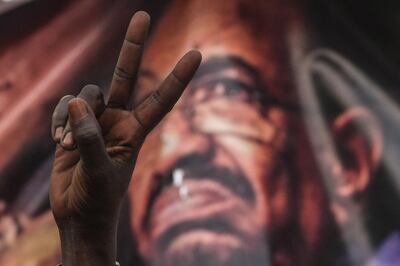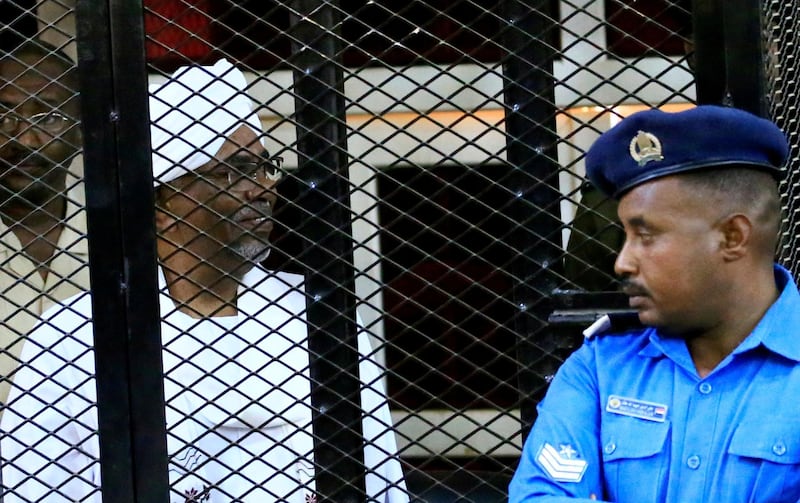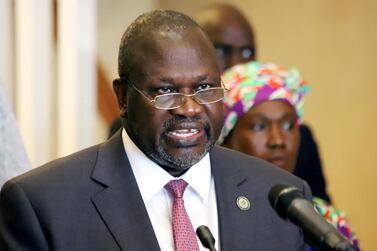Since his removal from power one year ago, Sudan's veteran leader Omar Al Bashir has been jailed on conviction of corruption, becoming the Middle East's latest fallen strongman.
Al Bashir, 76, is held in Khartoum's Kober Prison where many of his opponents were sent during his rule.
He ruthlessly crushed dissent after his rise to power in a 1989 coup.
For three decades, Al Bashir held on to the reins through several series of protests, even after the 2011 Arab uprisings toppled Hosni Mubarak of Egypt and Libyan leader Muammar Qaddafi.
But his fate was sealed after his own military reacted to mounting popular anger and removed him in April last year after months of street demonstrations.
Al Bashir was handed a two-year sentence over corruption charges in December and faces more charges over the deaths of protesters and the 1989 coup that brought him to power.
An appeals court upheld the sentence on Wednesday.
The former leader has also been indicted by the International Criminal Court in The Hague over war crimes and genocide in the Darfur region of western Sudan.
One of Africa's longest-serving presidents, Al Bashir showed many different faces during his almost 30 years at the helm.
Known for dancing and waving a cane before addressing loyalists, he remained defiant in the face of growing street protests before his overthrow.
Al Bashir proved himself a political survivor, evading the ICC and a myriad domestic challenges, from economic misery to internal conflicts.
He was indicted by the ICC over the Darfur conflict that erupted in 2003, when ethnic minority rebels took up arms against his government, accusing it of political and economic marginalisation of their region.
The UN estimates that about 300,000 people were killed and 2.5 million displaced in the conflict.
Human rights groups say Khartoum attacked suspected pro-rebel ethnic groups, raping, killing, looting and burning villages.

Al Bashir openly defied the ICC, travelling within Africa and further afield to countries including Russia and China.
He won re-election in 2010 and 2015 in polls boycotted by opposition groups.
The president even flew to Damascus, just days before protests erupted at home, to meet Syria's Bashar Al Assad.
In February, Sudan's transitional authorities who came to power months after his removal agreed that he be handed over to the ICC.
Al Bashir, who has two wives and no children, was born in 1944 in Hosh Bannaga, north of Khartoum, to a farming family.
He entered the military at a young age, rising through the ranks and joining an elite parachute regiment.
Al Bashir fought alongside the Egyptian army in the 1973 Arab-Israeli war.
In 1989, as brigade commander, he led a bloodless coup organised by scholar Hassan Al Turabi against a democratically elected government, then led by Sadiq Al Mahdi.
A career soldier, Al Bashir was known for his populist touch, insisting on being close to crowds and addressing them in colloquial Sudanese Arabic.
"Bashir became skilful over time," said Marc Lavergne, an Africa expert at the National Centre for Scientific Research in Paris.
"He learned the trade. At the beginning, he was not a prominent figure."
Al Bashir made public appearances even as protests raged against him after his government's decision in December 2018 to triple the price of bread, as Sudan grappled with shortages of food, medicine and foreign currency.
At a rally in January 2019, in the northern city of Atbara, Al Bashir voiced his disdain for protesters, calling them "traitors", "conspirators" and "rats" who should "return to their holes".
But the protests kept going for weeks until tens of thousands marched on April 6 to set up a sprawling camp outside the army headquarters in Khartoum.
Months of unrest and clashes with security troops killed dozens of protesters, wounded hundreds and left thousands in jail.
Between 1992 and 1996, Al Bashir led Sudan towards a more radical brand of religion and hosted Al Qaeda founder Osama bin Laden.
He sent religious volunteers to fight in the country's civil war with the South Sudanese.
Bin Laden was expelled under US pressure after Washington placed Sudan on its list of "state sponsors of terrorism".
Under Al Bashir's rule, South Sudan gained its independence in 2011 after two decades of conflict.
The secession, under a peace deal accepted by Al Bashir, led to the south taking most of Sudan's oilfields.






